|
From the Dean
 It is with much enthusiasm (and thanks) that I want to announce that we have completed work on the College of Agriculture 2015-2020 Strategic Plan: People-Purpose-Impact. Our 2009-2014 strategic plan provided an important roadmap for our College’s success over the past five years. I believe our new plan will build on that success, and it presents a bold plan for taking the College to even higher levels of excellence in all we do. It is with much enthusiasm (and thanks) that I want to announce that we have completed work on the College of Agriculture 2015-2020 Strategic Plan: People-Purpose-Impact. Our 2009-2014 strategic plan provided an important roadmap for our College’s success over the past five years. I believe our new plan will build on that success, and it presents a bold plan for taking the College to even higher levels of excellence in all we do.
You can find a copy of the text on-line here. A more polished presentation of the plan will come very soon. There is a lot to be excited about in this strategic plan. Some of the areas that particularly resonate with me include:
The idea of ‘living our land-grant mission’ and being intentional about integration of our learning, discovery, and engagement mission areas.
A focus on supporting a culture of excellence, innovation and leadership development across the College.
Supporting and enhancing faculty engagement in our undergraduate teaching program.
Strong sections on cultivating ‘a culture of we’ in our research mission, and on graduate student/post-doc preparation.
A focus on communicating Extension accomplishments and the value of Extension, as well an initiative focused on staffing and supporting county Extension educator positions.
A separate theme for our international activities.
A theme aimed at supporting a climate of respect and inclusiveness across the College, drawn heavily from the Diversity Action Team in Agriculture (DATA) strategic plan.
There is much more in the plan, of course, and you may find other areas that excite you. Over the course of this academic year, we will be talking more about the plan, and more importantly, its implementation.
I want to offer some thanks – especially to the 37-member task force made up of faculty, staff, and students who did the heavy lifting to create this plan. I simply could not have asked for more from this group (listed below) – they were engaged, enthusiastic, creative, and hit our deadlines. A special thanks to the team captains: Mike Gunderson, Undergraduate Education; Barb Golden, Research and Graduate Education; Rod Williams and Steve Wagoner, Engagement/Extension; Suzanne Nielsen, International; and Linda Prokopy, Climate/Community.
I’m very grateful to Purdue Extension for all the work they did to arrange and host 27 listening sessions around Indiana, engaging nearly 800 stakeholders. We learned a lot about their key opportunities and challenges and what changes and investments would help position us to better meet their needs and expectations. I also want to acknowledge the faculty, staff, and students in the College who responded to surveys, participated in listening sessions, and provided feedback on draft versions of the plan. Your thoughtful, pertinent observations certainly improved the final version. Finally, a big thanks to Dinah McClure for the terrific support she has provided through this entire process.
Of course, even more exciting than writing the strategic plan is actually making it happen! I can assure you that I am looking forward to working with each and every one of you to bring this plan to life.
All the best,

Strategic Plan Task Force:
Teaching Team
Mike Gunderson, AGEC (Chair)
Cale Bigelow, HLA
Haley Oliver, FS
Shelby Swain, AGEC
Mark Russell, ANSC
LeeAnn Williams, AGEC
Marcos Fernandez, OAP
Research Team
Barb Golden, BCHM (Chair)
Todd Applegate, ANSC
Ian Kaplan, ENTM
Joseph Irudayaraj, ABE
Songlin Fei, FNR
Ron Turco, AGRY
Ben Gramig, AGEC
Cliff Weil, AGRY
Karen Plaut, ARP
Extension Team
Steve Wagoner, Extension (Co-Chair)
Rod Williams, FNR (Co-Chair)
Jon Leuck, ARP/PAC
Becky Theller, Ag Comm
Kiersten Wise, BTNY
Curt Emanuel, Extension
Jason Henderson, Extension
International Team
Suzanne Nielsen, FS (Chair)
Heather Fabries, IPIA
Cherise Hall, Business Office
Klein Ileleji, ABE
Phillip Owens, AGRY
Jess Lowenberg-DeBoer, IPIA
Climate/Community Team
Linda Prokopy, FNR (Chair)
Brittini Brown, YDAE
Bernie Engel, ABE
Joan Fulton, AGEC
Leanne McGiveron, AgIT
Mark Tucker, YDAE
Kris Parker, Extension
Pam Morris, OMP
|
|
Purdue Agriculture People
|
Steve Yaninek to step down in Entomology
 Dr. Steve Yaninek has announced that he will step out of the role of head of the Department of Entomology to return to his scholarly activities, effective fall 2016. "We are very grateful to Dr. Yaninek for his leadership over the last 15 years," said Dean Jay Akridge. "He has been a great ambassador for the department." Dr. Bob Joly, Professor of Horticulture and Landscape Architecture, will chair the search advisory committee for the next Entomology Department Head and the following faculty and staff have agreed to serve on the committee: Dr. Steve Yaninek has announced that he will step out of the role of head of the Department of Entomology to return to his scholarly activities, effective fall 2016. "We are very grateful to Dr. Yaninek for his leadership over the last 15 years," said Dean Jay Akridge. "He has been a great ambassador for the department." Dr. Bob Joly, Professor of Horticulture and Landscape Architecture, will chair the search advisory committee for the next Entomology Department Head and the following faculty and staff have agreed to serve on the committee:
- Tim Gibb, Insect Diagnostician
- Catherine Hill, Professor
- Eileen Luke, CERIS Director
- Christian Krupke, Professor
- Linda Mason, Professor
- Doug Richmond, Associate Professor
- Jeff Stuart, Professor
- Jen Zaspel, Assistant Professor
College welcomes new faculty member
 R.P. Kingsly Ambrose, Assistant Professor, Agricultural and Biological Engineering. Kingsly earned his B.S. in Agricultural Engineering and M.S. in Agricultural Processing from Tamil Nadu Agricultural University, Coimbatore, India, and his Ph.D. in Agricultural & Biological Engineering from Purdue. He was a research scientist in the Central Institute of Post Harvest Engineering & Technology (CIPHET, Punjab, India) from 2001-2007, and a post-doctoral Research Associate at Purdue University before joining the faculty at Kansas State University in the Grain Science and Industry department. Kingsly's areas of research interest include agricultural safety and health and food process engineering. Specifically, he studies grain processing and milling, particle technology, particulate flow and materials handling, physical and chemical properties and correlation in food and feed materials, and process modeling and simulation. R.P. Kingsly Ambrose, Assistant Professor, Agricultural and Biological Engineering. Kingsly earned his B.S. in Agricultural Engineering and M.S. in Agricultural Processing from Tamil Nadu Agricultural University, Coimbatore, India, and his Ph.D. in Agricultural & Biological Engineering from Purdue. He was a research scientist in the Central Institute of Post Harvest Engineering & Technology (CIPHET, Punjab, India) from 2001-2007, and a post-doctoral Research Associate at Purdue University before joining the faculty at Kansas State University in the Grain Science and Industry department. Kingsly's areas of research interest include agricultural safety and health and food process engineering. Specifically, he studies grain processing and milling, particle technology, particulate flow and materials handling, physical and chemical properties and correlation in food and feed materials, and process modeling and simulation.
A reminder about tracking civil rights and diversity training
 The College of Agriculture is committed to making ongoing improvements to policies and practices to assure that race, ethnicity and gender are not barriers to success. During our USDA Federal Civil Rights Compliance Audit in 2012, it was brought to our attention that we did not have a formal tracking system in place to verify that all faculty, staff and graduate students received appropriate training. In order to comply with this, individuals are required to receive training in civil rights (the regulations), diversity awareness or sexual harassment each year.Therefore, we created a system utilizing the Qualtrics survey tool to have individuals self-report completion of their training. Rather than mandate a specific training, we are asking you to comply by recording training you have been to already or attend any training that fits your needs and interests and enhances your knowledge/understanding of diversity, civil rights or sexual harassment. Please note that alll of the activities detailed above for Diversity Awareness Week are great opportunities to meet your yearly training requirement for Purdue Agriculture. The College of Agriculture is committed to making ongoing improvements to policies and practices to assure that race, ethnicity and gender are not barriers to success. During our USDA Federal Civil Rights Compliance Audit in 2012, it was brought to our attention that we did not have a formal tracking system in place to verify that all faculty, staff and graduate students received appropriate training. In order to comply with this, individuals are required to receive training in civil rights (the regulations), diversity awareness or sexual harassment each year.Therefore, we created a system utilizing the Qualtrics survey tool to have individuals self-report completion of their training. Rather than mandate a specific training, we are asking you to comply by recording training you have been to already or attend any training that fits your needs and interests and enhances your knowledge/understanding of diversity, civil rights or sexual harassment. Please note that alll of the activities detailed above for Diversity Awareness Week are great opportunities to meet your yearly training requirement for Purdue Agriculture.
Report training at: https://ag.purdue.edu/civil_rights/Pages/report.aspx
Purdue Today features Andrea Liceaga's work in Food Sensory Lab
 Located in the basement of Nelson Hall of Food Science is Purdue's own Sensory Evaluation Laboratory, where voluntary panelists from the campus and community evaluate food products based on flavor, aroma, appearance, texture and more. The lab is considered Purdue's connection to partners in industry as it designs studies and collects data to support research and development for the products that line the aisles of our grocery stores. The lab also collaborates with faculty at Purdue and other universities in research projects that require a sensory evaluation component. "The tests are very standardized, objective and analytical so that we can statistically prove if the products are different, how the attributes are perceived, and finally, how much consumers like or dislike particular attributes of the product," says lab director Andrea Liceaga, associate professor of food science. Located in the basement of Nelson Hall of Food Science is Purdue's own Sensory Evaluation Laboratory, where voluntary panelists from the campus and community evaluate food products based on flavor, aroma, appearance, texture and more. The lab is considered Purdue's connection to partners in industry as it designs studies and collects data to support research and development for the products that line the aisles of our grocery stores. The lab also collaborates with faculty at Purdue and other universities in research projects that require a sensory evaluation component. "The tests are very standardized, objective and analytical so that we can statistically prove if the products are different, how the attributes are perceived, and finally, how much consumers like or dislike particular attributes of the product," says lab director Andrea Liceaga, associate professor of food science.
Full story: http://www.purdue.edu/newsroom/purduetoday/didyouknow/2015/Q3/did-you-know-sensory-evaluation-laboratory.html
Engagement opportunities at 2016 Indiana State Fair
 One of the new and exciting features in the Purdue Ag/Hort building at the 2015 Indiana State Fair was an engagement area where departments, programs, student organizations and educators were able to set up displays and interact with the fair-goers. If you or your group are interested in participating during the 2016 Indiana State Fair, contact Danica Kirkpatrick, Engagement Program Manager, to be added to the contact list for the 2016 fair. One of the new and exciting features in the Purdue Ag/Hort building at the 2015 Indiana State Fair was an engagement area where departments, programs, student organizations and educators were able to set up displays and interact with the fair-goers. If you or your group are interested in participating during the 2016 Indiana State Fair, contact Danica Kirkpatrick, Engagement Program Manager, to be added to the contact list for the 2016 fair.
2015 AgSEED Call for Proposals
AgSEED saw great success in its first two years. In year one, we received 95 proposals and funded 19 projects and last year, we received 84 proposals and funded 17 projects. Our land grant mission thrives on discovery and engagement that is vital to growth in Indiana agriculture and rural communities. Thanks to line item support from the State of Indiana, Purdue’s College of Agriculture has established AgSEED, an internal competitive grant program to foster Indiana’s leadership in plant and animal agriculture and rural growth, especially through entrepreneurial initiatives. The program funds grants based on proposals in Applied Research/ Extension and Basic Research. AgSEED funding is open to faculty and staff in the Colleges of Agriculture, Health and Human Sciences and Veterinary Medicine. The current funding period is one year and up to $50,000. A few 2 year grants may be awarded up to $75,000. Proposals must be submitted by your Pre-Award office by October 1, 2015 at 4pm. The Request for Proposals is here: http://www.agriculture.purdue.edu/in_focus/2015/September/AgSEED2015RFP.pdf. FAQs and the required cover page are available at https://ag.purdue.edu/agseed/Pages/default.aspx. Please direct questions to Meredith Cobb, mcobb2@purdue.edu or 494-3951.
Training modules available for faculty and staff
Risk Management, in collaboration with the Office of the Vice President for Ethics and Compliance and the Office of the Vice President for Human Resources, announces the availability of the Risk Management Employment Claims Initiative education program. The program helps employees and supervisors understand employment-related issues such as discrimination, harassment, disability awareness and accommodations, the Family and Medical Leave Act (FMLA), overtime rates, and other university leave policies. Participants will complete four training modules and corresponding certification quizzes: 1) Equal Opportunity; 2) Americans with Disabilities Act; 3) Wage and Hour Issues for Employees and Supervisors; and 4) Family and Medical Leave Act and University Leave Policies.
The training modules and instructions for accessing the certification quizzes are located on the Purdue Employee Portal. Each training module is approximately 20 to 25 minutes long. Training on the Americans with Disabilities Act and Equal Opportunity will also fulfill College of Agriculture requirements for civil rights training as required by the USDA. All faculty and staff are strongly encouraged to complete these training modules. Faculty and staff participation in these training modules impacts the College's share of insurance costs.
|
|
Awards and Recognitions
 Klein Ileleji, Agricultural and Biological Engineering, received the Innovative Extension Methods or Impact Assessment award from the American Society of Agricultural and Biological Engineers (ASABE) at the ASABE International Meeting in New Orleans in July. The ASABE competition encourages agricultural engineers in industry and public service to strive for excellence in extension activities through the interchange of ideas on successful methods and techniques. Dr. Ileleji, along with Samuel McNeill and George Opit, received the award for "Technical Assistance Program on Commodity Protection and Stored Grain Management in Nigeria." Klein Ileleji, Agricultural and Biological Engineering, received the Innovative Extension Methods or Impact Assessment award from the American Society of Agricultural and Biological Engineers (ASABE) at the ASABE International Meeting in New Orleans in July. The ASABE competition encourages agricultural engineers in industry and public service to strive for excellence in extension activities through the interchange of ideas on successful methods and techniques. Dr. Ileleji, along with Samuel McNeill and George Opit, received the award for "Technical Assistance Program on Commodity Protection and Stored Grain Management in Nigeria."
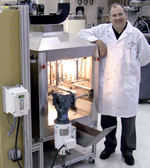 Kevin Keener, Food Science and Agricultural and Biological Engineering, has received the Purdue College of Agriculture’s Spirit of the Land Grant Mission Award. The Spirit of the Land Grant Mission Award recognizes faculty members for excellence in integrating and promoting all facets of the land grant mission—discovery, engagement, and learning—and who exemplify its spirit of partnership. This award highlights and celebrates faculty members who have successfully developed an integrated, comprehensive program that benefits agriculture nationally and/or internationally. Dr. Keener will deliver a seminar on his work later this fall at an award ceremony and reception. Kevin Keener, Food Science and Agricultural and Biological Engineering, has received the Purdue College of Agriculture’s Spirit of the Land Grant Mission Award. The Spirit of the Land Grant Mission Award recognizes faculty members for excellence in integrating and promoting all facets of the land grant mission—discovery, engagement, and learning—and who exemplify its spirit of partnership. This award highlights and celebrates faculty members who have successfully developed an integrated, comprehensive program that benefits agriculture nationally and/or internationally. Dr. Keener will deliver a seminar on his work later this fall at an award ceremony and reception.
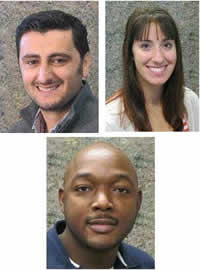 Three Agricultural and Biological Engineering graduate students were recognized for being among the top 5% of student presenters during NRES-sponsored sessions at the Annual International Meeting of the American Society of Agricultural and Biological Engineers (ASABE). Andi Hodaj was recognized for his presentation on Two-stage Ditch Scenarios and its Future Role as a Best Management Practice. Amanda Montgomery was recognized for her presentation on The effects of different biofuel crops and fertilizer rates on subsurface water quality and yield on marginal land. Carlington Wallace was recognized for his presentation on Quantifying the Effects of Future Climate Conditions on Runoff, Sediment, and Chemical Losses for Different Watershed Sizes. Three Agricultural and Biological Engineering graduate students were recognized for being among the top 5% of student presenters during NRES-sponsored sessions at the Annual International Meeting of the American Society of Agricultural and Biological Engineers (ASABE). Andi Hodaj was recognized for his presentation on Two-stage Ditch Scenarios and its Future Role as a Best Management Practice. Amanda Montgomery was recognized for her presentation on The effects of different biofuel crops and fertilizer rates on subsurface water quality and yield on marginal land. Carlington Wallace was recognized for his presentation on Quantifying the Effects of Future Climate Conditions on Runoff, Sediment, and Chemical Losses for Different Watershed Sizes.
|
|
Purdue Agriculture in the News
Extension publication provides two-year plan for beginning cover crop farmers
 A new Purdue Extension publication offers farmers a basic introduction and step-by-step instructions for using cover crops in a corn-soybean rotation. The publication, An Introduction to Integrating Cover Crops Into a Corn-Soybean Rotation, is intended for farmers who are new to using cover crops. It describes the essential principles for developing successful cover crop systems, including adjusting the planter and planting practices, scouting for insects and using good-quality seed. "Cover crops have many potential benefits, but farmers need to manage them carefully to avoid or reduce the risks to crop production," writes lead author Eileen Kladivko, professor of agronomy. The plan presented in the publication involves no-till farming methods, a system designed to conserve fertile topsoil from year to year. The publication is available free for download at Purdue Extension's The Education Store at www.edustore.purdue.edu. A new Purdue Extension publication offers farmers a basic introduction and step-by-step instructions for using cover crops in a corn-soybean rotation. The publication, An Introduction to Integrating Cover Crops Into a Corn-Soybean Rotation, is intended for farmers who are new to using cover crops. It describes the essential principles for developing successful cover crop systems, including adjusting the planter and planting practices, scouting for insects and using good-quality seed. "Cover crops have many potential benefits, but farmers need to manage them carefully to avoid or reduce the risks to crop production," writes lead author Eileen Kladivko, professor of agronomy. The plan presented in the publication involves no-till farming methods, a system designed to conserve fertile topsoil from year to year. The publication is available free for download at Purdue Extension's The Education Store at www.edustore.purdue.edu.
Full story: http://www.purdue.edu/newsroom/releases/2015/Q3/extension-publication-provides-two-year-plan-for-beginning-cover-crop-farmers.html
Effort on to stop spread of Asian longhorned beetle
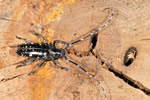 Cliff Sadof, Entomology, is urging people to check trees for signs of the invasive Asian longhorned beetle during the month of August, a time of peak emergence of the beetle, and report any sightings. Sadof noted that the U.S. Department of Agriculture's Animal and Plant Health Inspection Service, or APHIS, is in the midst of a campaign to raise public awareness of the beetle, which threatens urban and suburban shade trees, recreational resources such as parks, forest resources and wildlife. "If you see an Asian longhorned beetle you should to report it," he said. "It is highly destructive. Once a tree is infested there is no cure for it." APHIS said the beetle has led to the loss over 130,000 trees in the United States since it was discovered in 1996. Cliff Sadof, Entomology, is urging people to check trees for signs of the invasive Asian longhorned beetle during the month of August, a time of peak emergence of the beetle, and report any sightings. Sadof noted that the U.S. Department of Agriculture's Animal and Plant Health Inspection Service, or APHIS, is in the midst of a campaign to raise public awareness of the beetle, which threatens urban and suburban shade trees, recreational resources such as parks, forest resources and wildlife. "If you see an Asian longhorned beetle you should to report it," he said. "It is highly destructive. Once a tree is infested there is no cure for it." APHIS said the beetle has led to the loss over 130,000 trees in the United States since it was discovered in 1996.
Full story: http://www.purdue.edu/newsroom/releases/2015/Q3/effort-on-to-stop-spread-of-asian-longhorned-beetle.html
Endangered animals can be identified by rate of genetic diversity loss
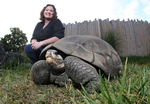 A Purdue study presents a novel approach for identifying vertebrate populations at risk of extinction by estimating the rate of genetic diversity loss, a measurement that could help researchers and conservationists better identify and rank species that are threatened or endangered. Populations with low genetic diversity may not be able to adapt to challenges such as changing environmental conditions, shrinking habitats or new diseases, which could put them at risk of disappearing. But a study by genetic researchers shows that the criteria currently used to identify at-risk species are not correlated with genetic diversity, suggesting that many threatened species could be overlooked. Janna Willoughby, a then-doctoral student in wildlife genetics, and Andrew DeWoody, professor of genetics, developed a statistical approach conservationists can use to estimate the number of generations remaining before a population reaches a threshold of low genetic variation. A Purdue study presents a novel approach for identifying vertebrate populations at risk of extinction by estimating the rate of genetic diversity loss, a measurement that could help researchers and conservationists better identify and rank species that are threatened or endangered. Populations with low genetic diversity may not be able to adapt to challenges such as changing environmental conditions, shrinking habitats or new diseases, which could put them at risk of disappearing. But a study by genetic researchers shows that the criteria currently used to identify at-risk species are not correlated with genetic diversity, suggesting that many threatened species could be overlooked. Janna Willoughby, a then-doctoral student in wildlife genetics, and Andrew DeWoody, professor of genetics, developed a statistical approach conservationists can use to estimate the number of generations remaining before a population reaches a threshold of low genetic variation.
Full story: http://www.purdue.edu/newsroom/releases/2015/Q3/endangered-animals-can-be-identified-by-rate-of-genetic-diversity-loss.html
U2U survey provides insight into farmers across 22 watersheds
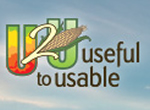 The Useful to Usable climate initiative based at Purdue has published a survey in the form of a statistical atlas with information on farmers' practices, beliefs about climate and weather and the tools they use to make farm decisions. Atlas 2, produced in collaboration with the U.S. Department of Agriculture's Sustainable Corn project, is the second in a two-part series. The 22 watershed areas surveyed in 2012 cover a substantial portion of 11 Corn Belt states, all of which are major corn and soybean crop areas. The survey was sent to 18,707 farmers with at least $100,000 in gross sales and a minimum of 80 acres of corn production in 22 six-digit Hydrologic Code Unit watersheds. Using this information and continuing with the format of the series, the new atlas provides additional findings by watershed. Also, each section contains a tabulated presentation of survey data and a series of maps that visually represent the distribution of responses across the study region. The Useful to Usable climate initiative based at Purdue has published a survey in the form of a statistical atlas with information on farmers' practices, beliefs about climate and weather and the tools they use to make farm decisions. Atlas 2, produced in collaboration with the U.S. Department of Agriculture's Sustainable Corn project, is the second in a two-part series. The 22 watershed areas surveyed in 2012 cover a substantial portion of 11 Corn Belt states, all of which are major corn and soybean crop areas. The survey was sent to 18,707 farmers with at least $100,000 in gross sales and a minimum of 80 acres of corn production in 22 six-digit Hydrologic Code Unit watersheds. Using this information and continuing with the format of the series, the new atlas provides additional findings by watershed. Also, each section contains a tabulated presentation of survey data and a series of maps that visually represent the distribution of responses across the study region.
Full story: http://www.purdue.edu/newsroom/releases/2015/Q3/u2u-survey-provides-insight-into-farmers-across-22-watersheds.html
Researcher to explore compounds in mint plants
 Natalia Dudareva, distinguished professor of biochemistry, has received a $1.4 million National Science Foundation grant to conduct mint research. She is part of a research team led by Michigan State University that received a $5.1 million NSF grant. Mints, or Lamiaceae, are the world's sixth-largest family of flowering plants. Dudareva's research will focus on identifying chemical compounds and their formation in 14 species of mint family. That will allow researchers to produce the compounds and increase their levels in plants. The research could lead to exploring new uses for plants of the mint family, such as for medicinal purposes. "This research is not only important for the mint industry, but also for agriculture and medicine as plant species in this family produce a wide range of metabolites used as food additives, medicinal compounds and other industrial purposes," Dudareva said. Natalia Dudareva, distinguished professor of biochemistry, has received a $1.4 million National Science Foundation grant to conduct mint research. She is part of a research team led by Michigan State University that received a $5.1 million NSF grant. Mints, or Lamiaceae, are the world's sixth-largest family of flowering plants. Dudareva's research will focus on identifying chemical compounds and their formation in 14 species of mint family. That will allow researchers to produce the compounds and increase their levels in plants. The research could lead to exploring new uses for plants of the mint family, such as for medicinal purposes. "This research is not only important for the mint industry, but also for agriculture and medicine as plant species in this family produce a wide range of metabolites used as food additives, medicinal compounds and other industrial purposes," Dudareva said.
Full story: http://www.purdue.edu/newsroom/releases/2015/Q3/purdue-researcher-to-explore-compounds-in-mint-plants.html
Purdue to help two Indiana regions bolster economic development
 A team of Purdue University community and regional development professionals will play a key role in advancing the efforts of two groups of Indiana counties that are working to develop regional approaches to growing businesses and creating jobs. The two regions, consisting of 11 counties in the state, have been selected by U.S. Department of Agriculture Rural Development to be part of Stronger Economies Together, a nationwide program undertaken in partnership with the regional rural development centers and the nation's land-grant university system. Professional staff from the Purdue Center for Regional Development and Purdue Extension will coordinate and provide leadership to the State Resource Team, composed of individuals from state and federal agencies, universities and other organizations with expertise in community and regional development. "The SET program is another example of how Purdue is strengthening collaborations to build vibrant economies across Indiana," said Jason Henderson, director of Purdue Extension. A team of Purdue University community and regional development professionals will play a key role in advancing the efforts of two groups of Indiana counties that are working to develop regional approaches to growing businesses and creating jobs. The two regions, consisting of 11 counties in the state, have been selected by U.S. Department of Agriculture Rural Development to be part of Stronger Economies Together, a nationwide program undertaken in partnership with the regional rural development centers and the nation's land-grant university system. Professional staff from the Purdue Center for Regional Development and Purdue Extension will coordinate and provide leadership to the State Resource Team, composed of individuals from state and federal agencies, universities and other organizations with expertise in community and regional development. "The SET program is another example of how Purdue is strengthening collaborations to build vibrant economies across Indiana," said Jason Henderson, director of Purdue Extension.
Full story: http://www.purdue.edu/newsroom/releases/2015/Q3/purdue-to-help-2-indiana-regions-bolster-economic-development.html
Purdue experts: Tree deaths across Indiana may be related to weather stress
 Homeowners and landowners need to keep an eye on trees that may be dying from weather-related stress, Purdue University tree experts say. Symptoms recently noted on mature oak, tulip and maple trees in Indiana include leaf scorch - the browning of leaves - branch dieback and premature defoliation. Rosie Lerner, Purdue Extension consumer horticulture specialist, said healthy trees do not die quickly, and there are likely numerous stress factors adding to what is happening to some trees. "Indiana weather has given us pretty much every extreme in the last few years from extreme heat and drought, to bitter cold and high winds and to floods," Lerner said. "The added stress, especially on urban trees that have compromised root systems, may make them more vulnerable than non-urban trees." Homeowners and landowners need to keep an eye on trees that may be dying from weather-related stress, Purdue University tree experts say. Symptoms recently noted on mature oak, tulip and maple trees in Indiana include leaf scorch - the browning of leaves - branch dieback and premature defoliation. Rosie Lerner, Purdue Extension consumer horticulture specialist, said healthy trees do not die quickly, and there are likely numerous stress factors adding to what is happening to some trees. "Indiana weather has given us pretty much every extreme in the last few years from extreme heat and drought, to bitter cold and high winds and to floods," Lerner said. "The added stress, especially on urban trees that have compromised root systems, may make them more vulnerable than non-urban trees."
Full story: http://www.purdue.edu/newsroom/releases/2015/Q3/purdue-experts-tree-deaths-across-indiana-may-be-related-to-weather-stress.html
National Conference for Agribusiness to feature new research
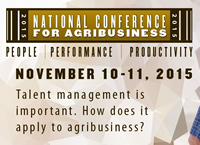 Results of a new survey about performance management practices in agribusinesses will be a featured discussion topic on Nov. 10-11 during the National Conference for Agribusiness at Purdue University. The conference, hosted by the Center for Food and Agricultural Business, will be at the Courtyard by Marriott, Lafayette, and will cover talent management topics, including performance management, which describes the formal employee review process. Data from the Performance Management in Agribusiness Survey will be released and summarized for the first time. Steve Vande Loo, retired national vice president of region commercialization for Coca-Cola Refreshments, will serve as keynote speaker. The conference goal is to help leaders shape performance management strategies within their organizations, said Michael Gunderson, associate director of the Center for Food and Agricultural Business and associate professor of agricultural economics. Given that survey responses indicated more than half of all middle managers in agribusiness believe their organizations are ineffective at performance management, the topic is vital. Results of a new survey about performance management practices in agribusinesses will be a featured discussion topic on Nov. 10-11 during the National Conference for Agribusiness at Purdue University. The conference, hosted by the Center for Food and Agricultural Business, will be at the Courtyard by Marriott, Lafayette, and will cover talent management topics, including performance management, which describes the formal employee review process. Data from the Performance Management in Agribusiness Survey will be released and summarized for the first time. Steve Vande Loo, retired national vice president of region commercialization for Coca-Cola Refreshments, will serve as keynote speaker. The conference goal is to help leaders shape performance management strategies within their organizations, said Michael Gunderson, associate director of the Center for Food and Agricultural Business and associate professor of agricultural economics. Given that survey responses indicated more than half of all middle managers in agribusiness believe their organizations are ineffective at performance management, the topic is vital.
Full story: http://tinyurl.com/owheqlb
No accident: Ancient walnut forests linked to languages, trade routes
 If Persian walnut trees could talk, they might tell of the numerous traders who moved along the Silk Roads' thousands of miles over thousands of years, carrying among their valuable merchandise the seeds that would turn into the mighty walnut forests that are spread across Asia. Research done by Keith Woeste, research geneticist for the USDA Forest Service and a Purdue adjunct assistant professor of forestry, shows that ancient languages match up with the genetic codes found in Persian walnut (Juglans regia) forests, suggesting that the stands of trees seen today may be remnants of the first planned afforestation known in the world. In a paper published in the journal PLoS One, Woeste found that the evolution of language and spread of walnut forests overlapped over wide swaths of Asia over thousands of years. He believes as traders traversed the Silk Roads, connecting Eastern Europe and Africa with far-East Asia, they purposely planted walnut forests as a long-term agricultural investment. If Persian walnut trees could talk, they might tell of the numerous traders who moved along the Silk Roads' thousands of miles over thousands of years, carrying among their valuable merchandise the seeds that would turn into the mighty walnut forests that are spread across Asia. Research done by Keith Woeste, research geneticist for the USDA Forest Service and a Purdue adjunct assistant professor of forestry, shows that ancient languages match up with the genetic codes found in Persian walnut (Juglans regia) forests, suggesting that the stands of trees seen today may be remnants of the first planned afforestation known in the world. In a paper published in the journal PLoS One, Woeste found that the evolution of language and spread of walnut forests overlapped over wide swaths of Asia over thousands of years. He believes as traders traversed the Silk Roads, connecting Eastern Europe and Africa with far-East Asia, they purposely planted walnut forests as a long-term agricultural investment.
Full story: http://www.purdue.edu/newsroom/releases/2015/Q3/no-accident-ancient-walnut-forests-linked-to-languages,-trade-routes.html
Center for Global Food Security seeks applicants for U.S. Borlaug fellows
 The Purdue Center for Global Food Security is seeking applications for U.S. Borlaug Fellows in Global Food Security. A total of $400,000 in funding for the U.S. Borlaug Fellows comes from a five-year, $5 million grant to Purdue from the U.S. Agency for International Development (USAID). "This program supports exceptional U.S. graduate students conducting research on topics related to USAID's global hunger and food security initiative, 'Feed the Future,' " said distinguished professor Gebisa Ejeta, who leads the center. Grants from this round range from $15,000 to $40,000 per student for projects lasting from six months to two years and are intended to provide support for graduate students interested in conducting critical food security research toward a master's or doctoral degree. The Purdue Center for Global Food Security is seeking applications for U.S. Borlaug Fellows in Global Food Security. A total of $400,000 in funding for the U.S. Borlaug Fellows comes from a five-year, $5 million grant to Purdue from the U.S. Agency for International Development (USAID). "This program supports exceptional U.S. graduate students conducting research on topics related to USAID's global hunger and food security initiative, 'Feed the Future,' " said distinguished professor Gebisa Ejeta, who leads the center. Grants from this round range from $15,000 to $40,000 per student for projects lasting from six months to two years and are intended to provide support for graduate students interested in conducting critical food security research toward a master's or doctoral degree.
Full story: http://www.purdue.edu/newsroom/releases/2015/Q3/center-for-global-food-security-seeks-applicants-for-u.s.-borlaug-fellows.html
Dates and Deadlines
September 16: Named Professor Renewal Seminar in celebration of Mitch Tuinstra. 3:30 pm, Deans Auditorium, Pfendler Hall
September 17: Celebration of Teaching Excellence. Activities throughout the day
September 19: Purdue Family Day
September 23: Ag Research Award Seminar and Reception – Dr. Nate Mosier, 3:00 pm, Deans Auditorium, Pfendler Hall
September 23: College of Agriculture Scholarship Dinner
October 1: Spirit of the Land Grant Mission Award – Dr. Kevin Keener, 2:00 pm, Deans Auditorium, Pfendler Hall
October 6: Purdue Agriculture Fall Career Fair
October 14-16: Purdue Extension Professional Development Conference
October 20-21: Board for International Food and Agricultural Development (BIFAD) fall meeting at Purdue
October 22: Visit to Purdue Agriculture by Dr. Sonny Ramaswamy, NIFA Director
Deadlines:
September 14: Distinguished Agriculture Alumni Award nominations
October 1: Certificate of Distinction nominations
October 1: AgSEED proposals
Upcoming internal funding deadlines for researchers
The Executive Vice President for Research and Partnerships office offers several internal funding opportunities to support researchers at Purdue. Here is a list of upcoming proposal deadlines and links to program descriptions:
o New R01/U01/P01 Program – due Sept. 17, 2015;
o Competing Renewal R01 Program – due Sept. 22;
o Laboratory and University Core Facility Research Equipment Program – Sept. 23, 2015;
o Non-Laboratory Research Infrastructure and Equipment Program – Tier 1 proposals due to assistant deans of research Sept. 22 with Tier 2 proposals due to EVPRP Sept. 23;
o Selected NIH Training Grant Program – due Sept. 25;
o Clifford Kinley Trust - Social Science –due to Karen Plaut by Sept. 28
o Showalter Trust –due to Karen Plaut by October 19
o NIH Centers Program – rolling deadlines.
For more dates and deadlines, check the Purdue Agriculture calendar.
|
|
|
|
|
 It is with much enthusiasm (and thanks) that I want to announce that we have completed work on the College of Agriculture 2015-2020 Strategic Plan: People-Purpose-Impact. Our 2009-2014 strategic plan provided an important roadmap for our College’s success over the past five years. I believe our new plan will build on that success, and it presents a bold plan for taking the College to even higher levels of excellence in all we do.
It is with much enthusiasm (and thanks) that I want to announce that we have completed work on the College of Agriculture 2015-2020 Strategic Plan: People-Purpose-Impact. Our 2009-2014 strategic plan provided an important roadmap for our College’s success over the past five years. I believe our new plan will build on that success, and it presents a bold plan for taking the College to even higher levels of excellence in all we do.



 The College of Agriculture is committed to making ongoing improvements to policies and practices to assure that race, ethnicity and gender are not barriers to success. During our USDA Federal Civil Rights Compliance Audit in 2012, it was brought to our attention that we did not have a formal tracking system in place to verify that all faculty, staff and graduate students received appropriate training. In order to comply with this, individuals are required to receive training in civil rights (the regulations), diversity awareness or sexual harassment each year.Therefore, we created a system utilizing the Qualtrics survey tool to have individuals self-report completion of their training. Rather than mandate a specific training, we are asking you to comply by recording training you have been to already or attend any training that fits your needs and interests and enhances your knowledge/understanding of diversity, civil rights or sexual harassment. Please note that alll of the activities detailed above for Diversity Awareness Week are great opportunities to meet your yearly training requirement for Purdue Agriculture.
The College of Agriculture is committed to making ongoing improvements to policies and practices to assure that race, ethnicity and gender are not barriers to success. During our USDA Federal Civil Rights Compliance Audit in 2012, it was brought to our attention that we did not have a formal tracking system in place to verify that all faculty, staff and graduate students received appropriate training. In order to comply with this, individuals are required to receive training in civil rights (the regulations), diversity awareness or sexual harassment each year.Therefore, we created a system utilizing the Qualtrics survey tool to have individuals self-report completion of their training. Rather than mandate a specific training, we are asking you to comply by recording training you have been to already or attend any training that fits your needs and interests and enhances your knowledge/understanding of diversity, civil rights or sexual harassment. Please note that alll of the activities detailed above for Diversity Awareness Week are great opportunities to meet your yearly training requirement for Purdue Agriculture.  Located in the basement of Nelson Hall of Food Science is Purdue's own Sensory Evaluation Laboratory, where voluntary panelists from the campus and community evaluate food products based on flavor, aroma, appearance, texture and more. The lab is considered Purdue's connection to partners in industry as it designs studies and collects data to support research and development for the products that line the aisles of our grocery stores. The lab also collaborates with faculty at Purdue and other universities in research projects that require a sensory evaluation component. "The tests are very standardized, objective and analytical so that we can statistically prove if the products are different, how the attributes are perceived, and finally, how much consumers like or dislike particular attributes of the product," says lab director
Located in the basement of Nelson Hall of Food Science is Purdue's own Sensory Evaluation Laboratory, where voluntary panelists from the campus and community evaluate food products based on flavor, aroma, appearance, texture and more. The lab is considered Purdue's connection to partners in industry as it designs studies and collects data to support research and development for the products that line the aisles of our grocery stores. The lab also collaborates with faculty at Purdue and other universities in research projects that require a sensory evaluation component. "The tests are very standardized, objective and analytical so that we can statistically prove if the products are different, how the attributes are perceived, and finally, how much consumers like or dislike particular attributes of the product," says lab director  One of the new and exciting features in the Purdue Ag/Hort building at the 2015 Indiana State Fair was an engagement area where departments, programs, student organizations and educators were able to set up displays and interact with the fair-goers. If you or your group are interested in participating during the 2016 Indiana State Fair, contact
One of the new and exciting features in the Purdue Ag/Hort building at the 2015 Indiana State Fair was an engagement area where departments, programs, student organizations and educators were able to set up displays and interact with the fair-goers. If you or your group are interested in participating during the 2016 Indiana State Fair, contact 

 Three Agricultural and Biological Engineering graduate students were recognized for being among the top 5% of student presenters during NRES-sponsored sessions at the Annual International Meeting of the
Three Agricultural and Biological Engineering graduate students were recognized for being among the top 5% of student presenters during NRES-sponsored sessions at the Annual International Meeting of the  A new
A new 
 A Purdue study presents a novel approach for identifying vertebrate populations at risk of extinction by estimating the rate of genetic diversity loss, a measurement that could help researchers and conservationists better identify and rank species that are threatened or endangered. Populations with low genetic diversity may not be able to adapt to challenges such as changing environmental conditions, shrinking habitats or new diseases, which could put them at risk of disappearing. But a study by genetic researchers shows that the criteria currently used to identify at-risk species are not correlated with genetic diversity, suggesting that many threatened species could be overlooked. Janna Willoughby, a then-doctoral student in wildlife genetics, and
A Purdue study presents a novel approach for identifying vertebrate populations at risk of extinction by estimating the rate of genetic diversity loss, a measurement that could help researchers and conservationists better identify and rank species that are threatened or endangered. Populations with low genetic diversity may not be able to adapt to challenges such as changing environmental conditions, shrinking habitats or new diseases, which could put them at risk of disappearing. But a study by genetic researchers shows that the criteria currently used to identify at-risk species are not correlated with genetic diversity, suggesting that many threatened species could be overlooked. Janna Willoughby, a then-doctoral student in wildlife genetics, and  The
The 
 A team of Purdue University community and regional development professionals will play a key role in advancing the efforts of two groups of Indiana counties that are working to develop regional approaches to growing businesses and creating jobs. The two regions, consisting of 11 counties in the state, have been selected by
A team of Purdue University community and regional development professionals will play a key role in advancing the efforts of two groups of Indiana counties that are working to develop regional approaches to growing businesses and creating jobs. The two regions, consisting of 11 counties in the state, have been selected by  Homeowners and landowners need to keep an eye on trees that may be dying from weather-related stress, Purdue University tree experts say. Symptoms recently noted on mature oak, tulip and maple trees in Indiana include leaf scorch - the browning of leaves - branch dieback and premature defoliation.
Homeowners and landowners need to keep an eye on trees that may be dying from weather-related stress, Purdue University tree experts say. Symptoms recently noted on mature oak, tulip and maple trees in Indiana include leaf scorch - the browning of leaves - branch dieback and premature defoliation.  Results of a new survey about performance management practices in agribusinesses will be a featured discussion topic on Nov. 10-11 during the National Conference for Agribusiness at Purdue University. The conference, hosted by the
Results of a new survey about performance management practices in agribusinesses will be a featured discussion topic on Nov. 10-11 during the National Conference for Agribusiness at Purdue University. The conference, hosted by the  If Persian walnut trees could talk, they might tell of the numerous traders who moved along the Silk Roads' thousands of miles over thousands of years, carrying among their valuable merchandise the seeds that would turn into the mighty walnut forests that are spread across Asia. Research done by
If Persian walnut trees could talk, they might tell of the numerous traders who moved along the Silk Roads' thousands of miles over thousands of years, carrying among their valuable merchandise the seeds that would turn into the mighty walnut forests that are spread across Asia. Research done by  The
The  Purdue University is a community where diversity is valued and incidents of hate and bias are not tolerated. Students, faculty, staff, and campus visitors who feel that they have been the victim of a bias related incident (or who have witnessed a bias related incident) are encouraged to report it online at
Purdue University is a community where diversity is valued and incidents of hate and bias are not tolerated. Students, faculty, staff, and campus visitors who feel that they have been the victim of a bias related incident (or who have witnessed a bias related incident) are encouraged to report it online at